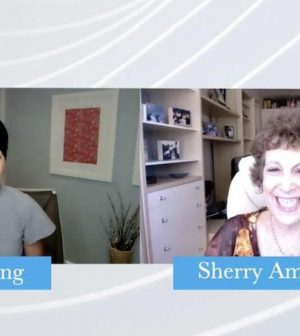- The Best Time of Day to Drink Bone Broth to Maximize Health Benefits
- 8 Ways to Increase Dopamine Naturally
- 7 Best Breads for Maintaining Stable Blood Sugar
- Gelatin vs. Collagen: Which is Best for Skin, Nails, and Joints?
- The Long-Term Effects of Daily Turmeric Supplements on Liver Health
- Could Your Grocery Store Meat Be Causing Recurring UTIs?
- Are You Making This Expensive Thermostat Error This Winter?
- Recognizing the Signs of Hypothyroidism
- 10 Strategies to Overcome Insomnia
- Could Artificial Sweeteners Be Aging the Brain Faster?
Post-COVID PTSD? Many Find Return to ‘Normal’ Unsettling

Many Americans felt relief and joy at the announcement last week that fully vaccinated people no longer need to wear masks at many indoor and outdoor locations.
But don’t be surprised if those good feelings come tinged with stress or worry: Mental health experts said in a HealthDay Now interview that the COVID-19 pandemic has left a lasting mark on people’s psyches, and folks will be struggling with lingering worry for some time to come.
“There’s actually such a thing as post-COVID stress disorder, which is along the lines of PTSD [post-traumatic stress disorder],” said Sherry Amatenstein, a psychotherapist based in New York City. “We lived for over a year with such fear and such uncertainty. Your body doesn’t know what to do. Our cues are all mixed up. Suddenly what was verboten is supposed to be OK again. How do you react?”
Amatenstein speaks from personal experience. She’s been fully vaccinated since February, but only now is starting to step back into public.
“I just actually did my first outdoor dining experience, taking a friend out for her birthday,” Amatenstein said. “I told myself, ‘well, look where I was a year ago and look where I am now. How did I do that?'”
Everyone is dealing with their pandemic year through a process very similar to the stages of grief, said Dr. Vivian Pender, president of the American Psychiatric Association.
During the past year, people have felt protest and shock and denial regarding the pandemic’s many impacts on their lives, Pender said, and some now are moving forward with acceptance and reconciliation.
“That’s, I think, happening to everyone. For those who have acknowledged that this has gone on, there’s still been a tremendous loss — loss of their way of life, loss or at least change at work, and change or loss of relationships as well,” Pender said.
“I think the general impact of having a worldwide pandemic is going to take a long time for us to reconcile,” Pender concluded.
Amatenstein had a tougher pandemic road to travel than most. She was diagnosed with cancer about a month before New York City closed down in the face of the nation’s first severe COVID-19 outbreak.
“I had to be in isolation, go to all my treatments alone, I had to have a COVID test before every round of chemo, so it was very scary,” she said.
Amatenstein completed her cancer treatment in October, but despite being healthy and fully vaccinated she’s been hesitant to resume her life as before.
“It’s difficult, especially when you have experienced trauma and fear yourself, to then venture out and start to live a somewhat ‘normal life’ when things are safer,” Amatenstein said. “I was very grateful and remain very grateful that I did get my vaccine, but it didn’t mean that my life changed very much, at least for a while.”
For many people, they will ease back into regular life along with the “pod” of friends and family to whom they have been limited during the pandemic.
“A lot of people are still in their pods, their pods are getting vaccinated, and then you venture out little by little, step by step,” Amatenstein said. “You know, when you’re diving in the pool, make sure there’s water in the pool.”
However, Amatenstein counsels her patients that while they might have lost some things to the pandemic, they have gained others.
“I tell people all the time, what are the gains you’ve gotten from this?” Amatenstein said. “I was always afraid to be alone. I would do anything just so I wouldn’t have to be alone and face the noise in my head.”
For others, the pandemic showed them that life doesn’t necessarily need to always move at a frantic pace.
“It’s allowed them to step back and say, well, I don’t have to be busy for the sake of being busy,” Amatenstein said. “You can learn to more appreciate time and freedom, and what you really do value and enjoy doing in your life.”
Pender agreed that for its stresses and challenges, the pandemic also brought some needed perspective to many people.
“Some people have taken stock of what’s important to them and how they were living their lives, and have redirected the way they’re going to go about their future,” Pender said. “They’ve changed jobs and relationships and they’re going in a more positive direction — at least that’s their intent.”
More information
The American Psychological Association has more about pandemic stress.
SOURCES: Vivian Pender, MD, president of the American Psychiatric Association; Sherry Amatenstein, MSW, a social worker and therapist, New York City
Source: HealthDay
Copyright © 2026 HealthDay. All rights reserved.










